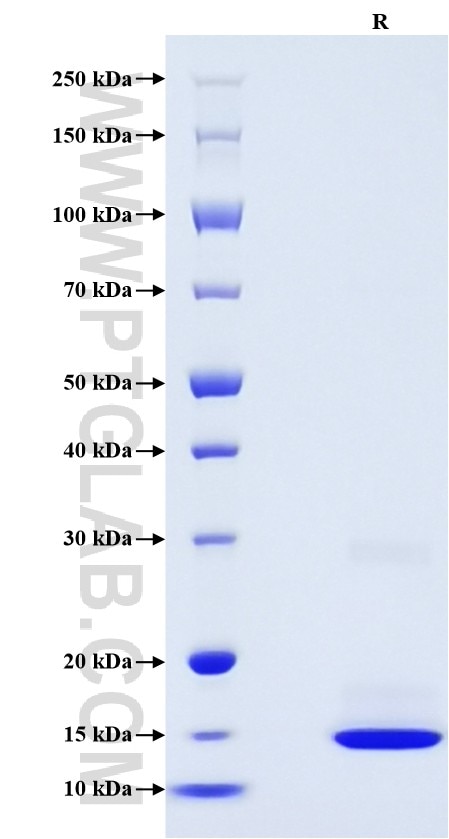Recombinant Human Procalcitonin/CALCA protein (His Tag)
Species
Human
Purity
>90 %, SDS-PAGE
Tag
His Tag
Activity
not tested
Cat no : Eg1060
Validation Data Gallery
Product Information
| Purity | >90 %, SDS-PAGE |
| Endotoxin | <0.1 EU/μg protein, LAL method |
| Activity |
Not tested |
| Expression | HEK293-derived Human Procalcitonin protein Ala26-Asn141 (Accession# P01258-1) with a His tag at the C-terminus. |
| GeneID | 796 |
| Accession | P01258-1 |
| PredictedSize | 13.9 kDa |
| SDS-PAGE | 14-15 kDa, reducing (R) conditions |
| Formulation | Lyophilized from sterile PBS, pH 7.4. Normally 5% trehalose and 5% mannitol are added as protectants before lyophilization. |
| Reconstitution | Briefly centrifuge the tube before opening. Reconstitute at 0.1-0.5 mg/mL in sterile water. |
| Storage Conditions |
It is recommended that the protein be aliquoted for optimal storage. Avoid repeated freeze-thaw cycles.
|
| Shipping | The product is shipped at ambient temperature. Upon receipt, store it immediately at the recommended temperature. |
Background
Calcitonin is a peptide hormone consisting of 32 amino acids, primarily synthesized by the parafollicular cells (C cells) of the human thyroid gland. It plays a crucial role in regulating calcium levels in the blood by decreasing them. Calcitonin opposes the actions of parathyroid hormone, which increases blood calcium levels. Calcitonin works through a G protein-coupled receptor, known as the calcitonin receptor, which predominantly transmits signals via the cAMP and PLC/IP3 pathways. Its primary physiological effects are on osteoclasts and the tubular epithelium of kidneys.
References:
1. Srinivasan, Akash et al. Journal of musculoskeletal & neuronal interactions vol. 20,4 (2020): 600-609. 2. Sexton, P M et al. Current medicinal chemistry vol. 6,11 (1999): 1067-93. 3. Davies, Julie. Journal of clinical pathology vol. 68,9 (2015): 675-9.
